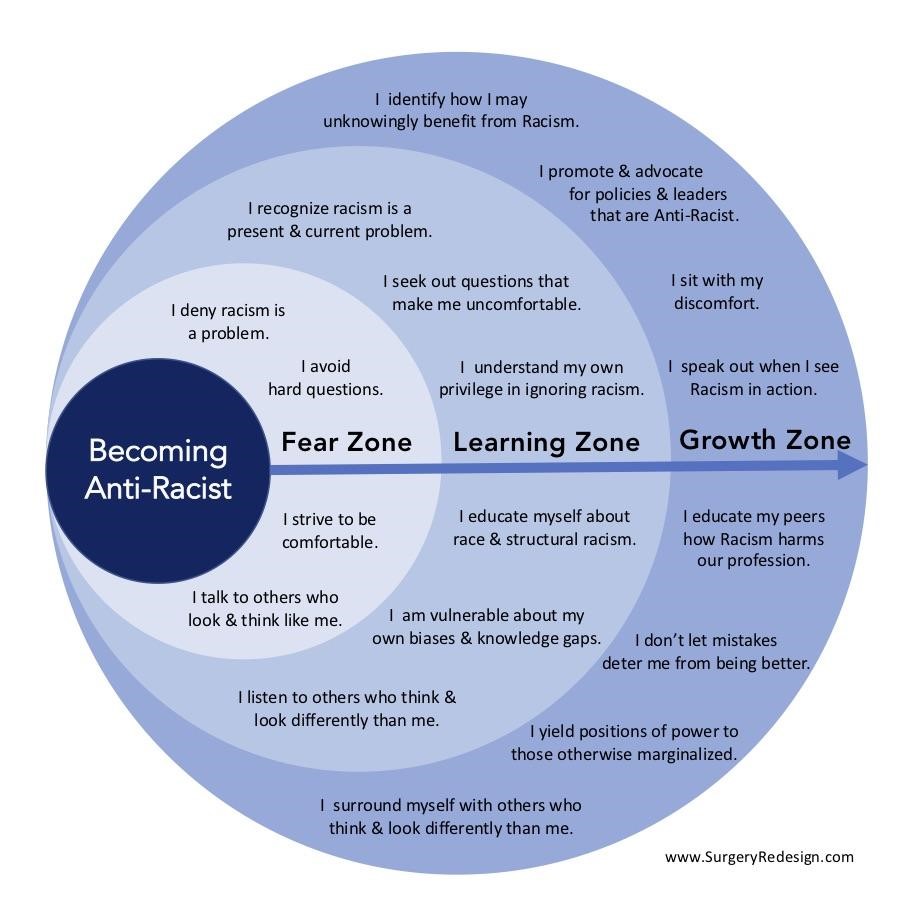Today’s To-Dos:
Learn
Explore Anti-Racism
Reflect
Reflect and respond in your workbook
Act
Create your Anti-Racism calendar
Learn
Today is dedicated to the concept at the heart of this seven day journey: Anti-Racism. A lot of us might claim that we are not racist, however, that does not mean that we are Anti-Racist. Ibram X. Kendi stated during the Aspen Ideas Festival, “… typically the concept of not-racism is really an act of denial […] so if the contrast from racist is not not-racist, it is Anti-Racist.” Therefore, Anti-Racism is an active state in which racism is consciously being fought. Racism is ingrained into our communities and societies, as we earlier explored with implicit biases and will explore when we discuss microaggressions on Day 6. It reaches even further into environmental justice, K-12 suspension rates, wage gaps, incarceration, healthcare, voting, education, and beyond. Anti-Racism is a call to action, especially through identifying and addressing racist ideas or racist policies. Anti-Racism views all groups as being equal, takes action to bring all groups to equitable ground, and holds those accountable who do not acknowledge racism’s existence or those who perpetuate racist ideas and policies.
Anti-Racism requires introspection before looking outwards, which can be intimidating for some, especially when it is racism, something so deeply entrenched within and throughout the systems in which we live. When we look at these systems – the ones we grew up in and currently live in – racism will reveal itself everywhere. This includes the schools we went to, the faces that were/are reflected around us, the media, movies, television, opportunities for education, curriculum, extracurriculars, opportunities for travel, access to healthcare, even the clothes we wear. The things we take for granted might be things we need to unlearn as givens in order to do the work toward Anti-Racism.
In the U.S., even if it isn’t explicitly stated, there is a caste system that defines our country. As Isabel Wilkerson writes, in the United States, “Race does the heavy lifting for [our] caste system.”The next logical thought would be: what are the steps we need to take in order to find a solution to this socio-historical problem? Remember that racism is not an issue unique to the United States, so do not imagine that you are exempt if you are not living in the U.S. As The New York Times points out, racism is prevalent in places like France, but is perpetually brushed under the rug or denied with claims of color-blindness. Color-blindness is blatant denial that racism, and everything that comes along with racism, exists. Acknowledging race as a social construct is paramount to deconstructing the power that racism holds in society and working toward an ideal future that equalizes groups, as the article Record numbers of Americans recognize racism as a problem. What could the solution be like? outlines. “Eliminating those racist policies leading to those racial disparities,” is going to be key in the individual work toward Anti-Racism, as Ibram X. Kendi explained on July 20, 2020.
As you reflect on today’s to-dos, keep in mind that this is a long-term process you are beginning (or have already begun) and therefore it is never-ending and always developing. Take a look at the image below or download the PDF to have for yourself, and internalize what it might mean for you (note the infinite growth zone):
Next Steps
Please go to pages 9-11 in your workbook for a reflection and an action.
Additional Resources on Anti-Racism
If you want to learn more about systemic racism, current Anti-Racism efforts, how Anti-Racism is different from allyship, here are additional resources that you may want to read or watch.
- Be Anti-Racist: A Journal for Awareness, Reflection, and Action by Ibram X. Kendi
- RaceWorks
- The Great Unlearn
- Anti-Racist Online Pedagogy
- Center for Antiracist Research
- Brene Brown’s Podcast with Ibram X. Kendi
- Aspen Institute: How to be an Anti Racist with Ibram X. Kendi
- Uncomfortable Conversations with a Black Man
- The Black Lives Matter Movement and the Power of Protest
- Anti-Racist Resource Guide
- What it really means to be an Anti-Racist, and why it’s not the same as being an ally
- Being Antiracist, National Museum of African American History & Culture



